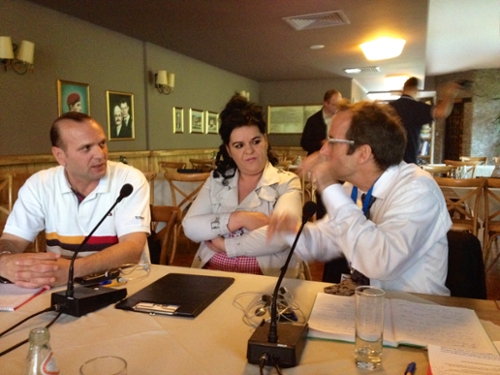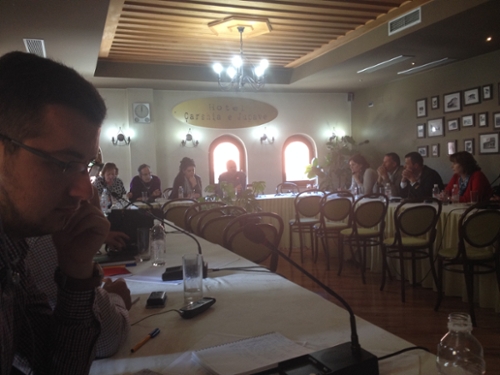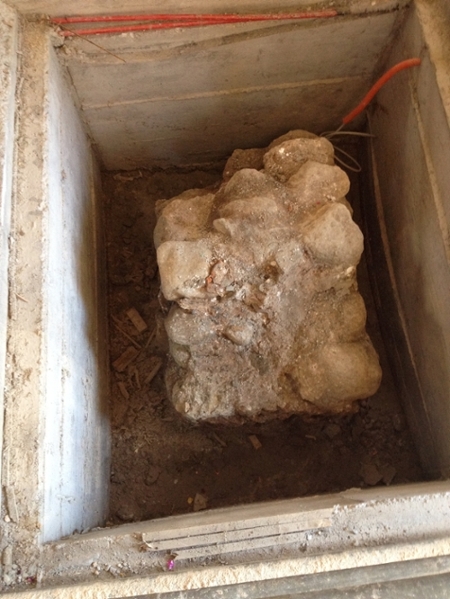Une e di se si uji- I know it like water
This last week started off bright and early with a round table in Prizin.
Prizin- Round Table- Anton, Mimi, and Patrick:

Anton was representing CLARD and I tagged along to take notes on the access to justice survey. After five round tables the group has definitely fallen into a rhythm on how we conduct such meetings. The participants may vary with each town but the goal is always the same, answering the question "what is the main problem in implementing your rights within your region?" My last few blogs have given a general overview of the differences in each region and for the round table in Prizin the issue of physical disabilities was at the forefront. When we participate in these round tables there is always one or two moments that really strike at my soul, issues that we just take for granted within the States. In this round table we had the executive director of the muscular dystrophy group along with a wheelchair bound volunteer present. What really struck me was the absolute "institutional violence" that was so prevalent within both of their stories. The wheelchair bound participant spoke of the fact that when she goes to the court house to issue complaints that she cannot even access the building. And that the security guards and court house workers have become so ambivalent that they no longer offer to help her. She literally sits outside the courthouse waiting for help, or has to bring a long an able bodied person to file her personal complaint. Her plight strikes at the heart of the access to justice issue- this is not about war crime/human right violations in a big scale scope. This program is about taking a system, that is quite perfect on its face, and actually making it work for the citizenry. It is about closing that gap between the people and their access to justice. Small things like being able to access a court house or knowing where to go to file a complaint. Kosovo is definitely a work in progress- but one has to take courage in the fact that there is on going effort to correct the system for all of the people.
Gjackov- Round Table- Participants:

The Gjackov round table commenced on Thursday morning after a car pool ride with CLARD and PrishtinaREA. I really admire the commitment of all three organizations (CLARD, PrishtinaREA, and OSCE) to working with each other and on fostering such a long term plan for Kosovo. As these round tables have advanced I have noticed a trend to dig at the participant's stories. In Gjackov the Roma community was highly represented and one woman had a very interesting story about property and the municipality. Through the translation I learned that this Roma woman had left the country when the war broke out and traveled to Germany to work with her husband. They came back in 2002, and somehow "asked" the municipality if the could build a house on land owned by the Gjackov municipality. In the earlier round tables this would have been met with vague questions on the time line of the construction and when permission was granted. But since we are further down the line, and this was the sixth round table, all three mediators really dug at the story looking for information on how this property dispute came to be. Through the pointed questioning we learned that the Roma community feels entitled to land and housing because the international programs have been promising them housing since the end of the war. But the situation at hand was even more complicated because this woman and her husband had built a three story home on this municipal land from the apparent "permission" of the former mayor. There is now a new mayor in Gjackov and the Roma woman expressed her concern that she was going to lose her investment in the house because the new mayor was not acknowledging the "land transfer". The entire situation was extremely tense after a municipal worker and the Roma woman sank into a five minute shouting match over the legality of the property and "promises" that had been made. I lost most of the translation in those minutes- the conversation was going too fast for the translator. But after that had settled down the municipal worker made a very interesting comment that because the Roma had no registered addresses they could not be included on the future housing list. Anton pointed out how silly that criteria was given the situation. How can you have a permanent address when you are literally in need of housing? Some of the Roma community stated that they were living in cargo crates waiting for the municipality to acknowledge their existence. Bullets (property dispute), ombudsperson (people think it's a legal aid service instead of a regulatory method on official institutions), and women's rights (domestic violence is a prevalent problem) were all mentioned as well. The entire session is in my top three of the round tables.
I was also introduced to the phrase, "I know it like water" in Gjackov. Mimi explained that when people take the literal translation of the phrase it turns in to the water explanation. But the parallel (and more accurate) translation would be "I know it like the back of my hand". There are few things that I know like the back of my hand, but volleyball is definitely one of them. And the more I thought about it, I was struck with just how blessed I am for this actual experience. I may not know the Kosovo Constitution like the back of my hand, but I do feel that I am starting to know myself to my very core. We have had some amazing conversations with people in Kosovo about knowing things like water, or a simpler example, about knowing their personal soap boxes. For Abby it's developmental problems in general. For me it's tribal rights and Native American sovereignty. For our friend Igor it's the economic choices of Serbia. We all have our soap box. And I am lucky enough to be in an experience that reflects my soap box, so as we say here, "faleminderit shume".

Between the round tables I worked on re-drafting my Letter of Rights memo. A PILPG member was kind enough to look it over for me and offered some positive critiques that I feel are really going to shape this memo into what it needs to be. Anton told me that he wants to take it into a police meeting on June 24th, so I am experiencing the true law student rush of deadlines. I finally sorted out the difference between the European Court of Human Rights and the European Union Law, plus the interaction between the two. It was a grand accomplishment and I have the hand drawn flow charts to prove it. I also accompanied our native Kosovar intern to check on her test date and time at Prishtina University. The poor girl is taking her final exams at the end of June and on top of that has to travel to the school and check on her exam time "old school" style. She found her time in the 9am section- and told me that where she was not exactly happy with a morning exam, she would at least get it out of the way. It seems that all law students dread the morning exams- but we know that it is better for our moral than waiting until 3pm that day to take a grueling exam.

We also traveled to Albania this weekend. Our travel adventures have been wide and varied to this point. This time around we drove down to Alabania in an unmarked UN car accompanied by Joe, a University of South Carolina alum and former rugby player, that hails from China and works for the UNMIK mission. The man is a saint, drove all the way to Albania and then another two hours to the "perfect" beach spot so that we could truly appreciate the beauty of the Balkans.

I would say that it was well worth it. Plus the hostel experience was out of this world. Being an amateur hostel participant I really did not know what to expect. But when we arrived Friday night the hostel was quiet, clean, and very accomodating. They even fed us breakfast the next morning! When we returned Saturday evening we found the an entire British rugby team in residence across the hall. That evening was an adventure but since we were all suffering from beach exhaustion it quickly became a non issue. The next day, Sunday, we drove away from the hostel and traveled to a mountain top fort as well as the city of Prizin. Prizin is located in Kosovo and is the place that all native Kosovars recommend to visit. Joe has been to the region several times and took us on a walking tour past a mosque, Greek Orthodox Church, and a Catholic Church. We were not allowed in to the mosque, a Kosovar man chased us to the stairs, and as far as we can tell was lamenting the state of our apparel (pants and short sleeved shirts- no head scarf) in Albanian. We quickly backed off and everything returned to normal when we entered into the Greek Orthodox Church. Unfortunately the Greek Orthodox Church had just been through a renovation in which they ran out of money so the entire building was empty and white washed (no murals). But the architecture was beautiful and we appreciated the chance to take a look around. We then moved on to the Catholic Church.

Notice the intricate doors. On the bottom they depict the Ten Commandments. Because I was very curious about the church I approached the doors and was a tad bit aggressive in trying to open them. Which did not happen, they were very firmly locked. But my style attracted the attention of two near by men that turned out to be the local priest and assistant of the church! They invited us in and tried their best to translate the history of the place to us. The entire experience was amazing, the church it self has been destroyed three times in the various Balkan wars and the one standing now is 150 years old. They are also experiencing renovation, and they too have unfortunately ran out of money. But before the funds ceased the construction crew uncovered a 5th Century column from the original foundation of the church.

My inner archaeologist freaked out a little over such an amazing discovery, but then it got even better! After discovering the column the construction crew was on high alert for anything else unusual, plus a team of archaeologists was called in to examine the premise. As our friend Taylor would say, "my people!" Whomever the church hired, or the government sent, they found additional foundational "flaws". Namely tunnels that ran under the church and possibly through the city. In one of the side sanctuary spaces they found a 12th century tunnel. On the left side of the church they found a tunnel entrance and a crypt. Things got a little "lost in translation" around this point, but from what I can tell they also found a mass grave. The mass grave was unrecorded, the church had absolutely no idea that it was there. But they do know that the people in it were Christians, the burial culture (arms crossed over the body) and the religious jewelry (crosses) all pointed to devout followers. From what the church has pieced together the grave may contain victims of an Ottoman massacre campaign. The church, which contains about 300 Catholic families of the region, decided to re bury the remains within the church foundation and are continuing their research.
The renovations have petered out for this amazing church- but the what they have is fantastic. The murals held the signature "Madonna blue" along with the requisite stars. But the weird part was that there was an "all seeing eye" painted into the dome area that is usually reserved for a religious figure. When I pointed it out to the priest he immediately said, "No Illuminati". And I just nodded my head and said, "Of course not." Super interesting, and I would have to hypothesize very rare. The only background they could give us about the murals was that they were done by "an army of Austrians". So this is just further proof that there is never a dull moment in Kosovo!
